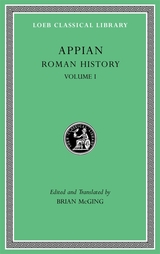
Rome’s foreign wars, nation by nation.
Appian (Appianus) is among our principal sources for the history of the Roman Republic, particularly in the second and first centuries BC, and sometimes our only source, as for the Third Punic War and the destruction of Carthage. Born circa AD 95, Appian was an Alexandrian official at ease in the highest political and literary circles who later became a Roman citizen and advocate. He apparently received equestrian rank, for in his later years he was offered a procuratorship. He died during the reign of Antoninus Pius (emperor 138–161).
Appian’s theme is the process by which the Roman Empire achieved its contemporary prosperity, and his unique method is to trace in individual books the story of each nation’s wars with Rome up through her own civil wars. Although this triumph of “harmony and monarchy” was achieved through characteristic Roman virtues, Appian is unusually objective about Rome’s shortcomings along the way. His history is particularly strong on financial and economic matters, and on the operations of warfare and diplomacy.
Of the work’s original twenty-four books, only the Preface and Books 6–9 and 11–17 are preserved complete or nearly so: those on the Spanish, Hannibalic, African, Illyrian, Syrian, and Mithridatic wars, and five books on the civil wars.
This edition of Appian replaces the original Loeb edition by Horace White and adds the fragments, as well as his letter to Fronto.
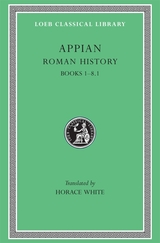
Appian (Appianus) was a Greek official of Alexandria. He saw the Jewish rebellion of 116 CE, and later became a Roman citizen and advocate and received the rank of eques (knight). In his older years he held a procuratorship. He died during the reign of Antoninus Pius who was emperor 138161 CE. Honest admirer of the Roman empire though ignorant of the institutions of the earlier Roman republic, he wrote, in the simple 'common' dialect, 24 books of 'Roman affairs', in fact conquests, from the beginnings to the times of Trajan (emperor 98117 CE). Eleven have come down to us complete, or nearly so, namely those on the Spanish, Hannibalic, Punic, Illyrian, Syrian, and Mithridatic wars, and five books on the Civil Wars. They are valuable records of military history.
The Loeb Classical Library edition of Appian is in four volumes.
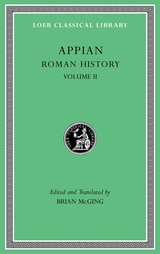
Rome’s foreign wars, nation by nation.
Appian (Appianus) is among our principal sources for the history of the Roman Republic, particularly in the second and first centuries BC, and sometimes our only source, as for the Third Punic War and the destruction of Carthage. Born circa AD 95, Appian was an Alexandrian official at ease in the highest political and literary circles who later became a Roman citizen and advocate. He apparently received equestrian rank, for in his later years he was offered a procuratorship. He died during the reign of Antoninus Pius (emperor 138–161).
Appian’s theme is the process by which the Roman Empire achieved its contemporary prosperity, and his unique method is to trace in individual books the story of each nation’s wars with Rome up through her own civil wars. Although this triumph of “harmony and monarchy” was achieved through characteristic Roman virtues, Appian is unusually objective about Rome’s shortcomings along the way. His history is particularly strong on financial and economic matters, and on the operations of warfare and diplomacy.
Of the work’s original twenty-four books, only the Preface and Books 6–9 and 11–17 are preserved complete or nearly so: those on the Spanish, Hannibalic, African, Illyrian, Syrian, and Mithridatic wars, and five books on the civil wars.
This edition of Appian replaces the original Loeb edition by Horace White and adds the fragments, as well as his letter to Fronto.
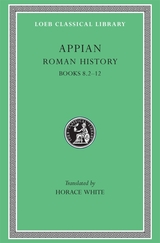
Appian (Appianus) was a Greek official of Alexandria. He saw the Jewish rebellion of 116 CE, and later became a Roman citizen and advocate and received the rank of eques (knight). In his older years he held a procuratorship. He died during the reign of Antoninus Pius who was emperor 138161 CE. Honest admirer of the Roman empire though ignorant of the institutions of the earlier Roman republic, he wrote, in the simple 'common' dialect, 24 books of 'Roman affairs', in fact conquests, from the beginnings to the times of Trajan (emperor 98117 CE). Eleven have come down to us complete, or nearly so, namely those on the Spanish, Hannibalic, Punic, Illyrian, Syrian, and Mithridatic wars, and five books on the Civil Wars. They are valuable records of military history.
The Loeb Classical Library edition of Appian is in four volumes.
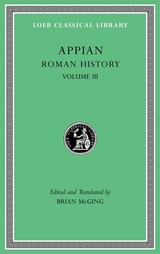
Rome’s foreign wars, nation by nation.
Appian (Appianus) is among our principal sources for the history of the Roman Republic, particularly in the second and first centuries BC, and sometimes our only source, as for the Third Punic War and the destruction of Carthage. Born circa AD 95, Appian was an Alexandrian official at ease in the highest political and literary circles who later became a Roman citizen and advocate. He apparently received equestrian rank, for in his later years he was offered a procuratorship. He died during the reign of Antoninus Pius (emperor 138–161).
Appian’s theme is the process by which the Roman Empire achieved its contemporary prosperity, and his unique method is to trace in individual books the story of each nation’s wars with Rome up through her own civil wars. Although this triumph of “harmony and monarchy” was achieved through characteristic Roman virtues, Appian is unusually objective about Rome’s shortcomings along the way. His history is particularly strong on financial and economic matters, and on the operations of warfare and diplomacy.
Of the work’s original twenty-four books, only the Preface and Books 6–9 and 11–17 are preserved complete or nearly so: those on the Spanish, Hannibalic, African, Illyrian, Syrian, and Mithridatic wars, and five books on the civil wars.
This edition of Appian replaces the original Loeb edition by Horace White and adds the fragments, as well as his letter to Fronto.
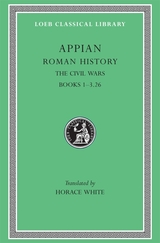
Appian (Appianus) was a Greek official of Alexandria. He saw the Jewish rebellion of 116 CE, and later became a Roman citizen and advocate and received the rank of eques (knight). In his older years he held a procuratorship. He died during the reign of Antoninus Pius who was emperor 138161 CE. Honest admirer of the Roman empire though ignorant of the institutions of the earlier Roman republic, he wrote, in the simple 'common' dialect, 24 books of 'Roman affairs', in fact conquests, from the beginnings to the times of Trajan (emperor 98117 CE). Eleven have come down to us complete, or nearly so, namely those on the Spanish, Hannibalic, Punic, Illyrian, Syrian, and Mithridatic wars, and five books on the Civil Wars. They are valuable records of military history.
The Loeb Classical Library edition of Appian is in four volumes.
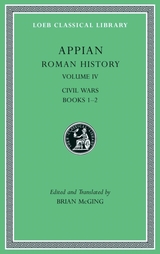
Rome’s internal conflicts, from the Gracchi to the Empire.
Appian (Appianus) is among our principal sources for the history of the Roman Republic, particularly in the second and first centuries BC, and sometimes our only source, as for the Third Punic War and the destruction of Carthage. Born circa AD 95, Appian was an Alexandrian official at ease in the highest political and literary circles who later became a Roman citizen and advocate. He apparently received equestrian rank, for in his later years he was offered a procuratorship. He died during the reign of Antoninus Pius (emperor 138–161).
Appian’s theme is the process by which the Roman Empire achieved its contemporary prosperity, and his unique method is to trace in individual books the story of each nation’s wars with Rome up through her own civil wars. Although this triumph of “harmony and monarchy” was achieved through characteristic Roman virtues, Appian is unusually objective about Rome’s shortcomings along the way. His history is particularly strong on financial and economic matters, and on the operations of warfare and diplomacy.
Of the work’s original twenty-four books, only the Preface and Books 6–9 and 11–17 are preserved complete or nearly so: those on the Spanish, Hannibalic, African, Illyrian, Syrian, and Mithridatic wars, and five books on the civil wars.
This edition of Appian replaces the original Loeb edition by Horace White and adds the fragments, as well as his letter to Fronto.
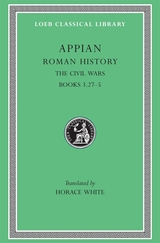
Appian (Appianus) was a Greek official of Alexandria. He saw the Jewish rebellion of 116 CE, and later became a Roman citizen and advocate and received the rank of eques (knight). In his older years he held a procuratorship. He died during the reign of Antoninus Pius who was emperor 138–161 CE. Honest admirer of the Roman empire though ignorant of the institutions of the earlier Roman republic, he wrote, in the simple “common” dialect, 24 books of “Roman affairs,” in fact conquests, from the beginnings to the times of Trajan (emperor 98–117 CE). Eleven have come down to us complete, or nearly so, namely those on the Spanish, Hannibalic, Punic, Illyrian, Syrian, and Mithridatic wars, and five books on the Civil Wars. They are valuable records of military history.
The Loeb Classical Library edition of Appian is in four volumes.
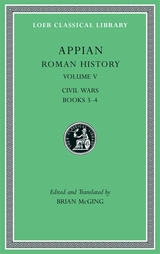
Rome’s internal conflicts, from the Gracchi to the Empire.
Appian (Appianus) is among our principal sources for the history of the Roman Republic, particularly in the second and first centuries BC, and sometimes our only source, as for the Third Punic War and the destruction of Carthage. Born circa AD 95, Appian was an Alexandrian official at ease in the highest political and literary circles who later became a Roman citizen and advocate. He apparently received equestrian rank, for in his later years he was offered a procuratorship. He died during the reign of Antoninus Pius (emperor 138–161).
Appian’s theme is the process by which the Roman Empire achieved its contemporary prosperity, and his unique method is to trace in individual books the story of each nation’s wars with Rome up through her own civil wars. Although this triumph of “harmony and monarchy” was achieved through characteristic Roman virtues, Appian is unusually objective about Rome’s shortcomings along the way. His history is particularly strong on financial and economic matters, and on the operations of warfare and diplomacy.
Of the work’s original twenty-four books, only the Preface and Books 6–9 and 11–17 are preserved complete or nearly so: those on the Spanish, Hannibalic, African, Illyrian, Syrian, and Mithridatic wars, and five books on the civil wars.
This edition of Appian replaces the original Loeb edition by Horace White and adds the fragments, as well as his letter to Fronto.
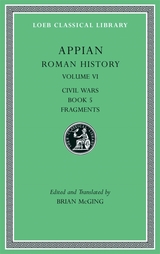
Rome’s internal conflicts, from the Gracchi to the Empire.
Appian (Appianus) is among our principal sources for the history of the Roman Republic, particularly in the second and first centuries BC, and sometimes our only source, as for the Third Punic War and the destruction of Carthage. Born circa AD 95, Appian was an Alexandrian official at ease in the highest political and literary circles who later became a Roman citizen and advocate. He apparently received equestrian rank, for in his later years he was offered a procuratorship. He died during the reign of Antoninus Pius (emperor 138–161).
Appian’s theme is the process by which the Roman Empire achieved its contemporary prosperity, and his unique method is to trace in individual books the story of each nation’s wars with Rome up through her own civil wars. Although this triumph of “harmony and monarchy” was achieved through characteristic Roman virtues, Appian is unusually objective about Rome’s shortcomings along the way. His history is particularly strong on financial and economic matters, and on the operations of warfare and diplomacy.
Of the work’s original twenty-four books, only the Preface and Books 6–9 and 11–17 are preserved complete or nearly so: those on the Spanish, Hannibalic, African, Illyrian, Syrian, and Mithridatic wars, and five books on the civil wars.
This edition of Appian replaces the original Loeb edition by Horace White and adds the fragments, as well as his letter to Fronto.
READERS
Browse our collection.
PUBLISHERS
See BiblioVault's publisher services.
STUDENT SERVICES
Files for college accessibility offices.
UChicago Accessibility Resources
home | accessibility | search | about | contact us
BiblioVault ® 2001 - 2025
The University of Chicago Press









